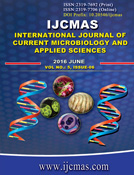


 National Academy of Agricultural Sciences (NAAS)
National Academy of Agricultural Sciences (NAAS)

|
PRINT ISSN : 2319-7692
Online ISSN : 2319-7706 Issues : 12 per year Publisher : Excellent Publishers Email : editorijcmas@gmail.com / submit@ijcmas.com Editor-in-chief: Dr.M.Prakash Index Copernicus ICV 2018: 95.39 NAAS RATING 2020: 5.38 |
Methicillin-resistant Staphylococcus aureus (MRSA) is a global public health problem. MRSA infection leads to longer hospital stays, increased healthcare cost, and significant morbidity and mortality. We determined the prevalence of MRSA at the Intensive Care Units (ICU) of Minia University Hospital (MUH) and Minia Insurance Hospital (MIH) among Egyptian healthcare workers (HCW) and patients. Also, we examined the MRSA molecular types to determine if the HCW contribute to the spread of MRSA infection. This study included 260 different samples that included 110 nasal swabs from HCW, 60 swabs from endotracheal tube secretion of patients and 90 swabs from the hospitals' environment (roofs, floor, beds, walls, sheets and equipment). The swabs were cultured on mannitol salt agar and MRSA strains were identified by biochemical reactions, antimicrobial susceptibility testing and PCR using specific primers for the coagulase and mecA gene. MRSA strains were confirmed by PCR through detection of mecA gene. Typing of the coagulase-positive strains was performed using RFLP. MRSA colonization was 11.8%, 13.3% and 2.2% among HCW, patients and environmental samples, respectively. Antibiotyping revealed four different antibiotypes. Antibiotype 2 was the most common pattern (8 isolates), 6 of them belonged to the coA C2a genotype. Interestingly, RFLP of coA gene revealed sharing of strains between HCW and patients. Our results sets a warning that Egyptian HCW could be a possible source or transmission of MRSA infection, which necessitates the application of proper infection control measures.
 |
 |
 |
 |
 |